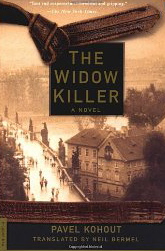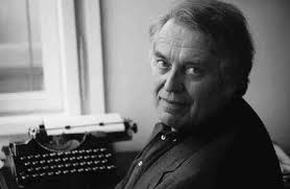This is a krimie set in Prague during the last days of the Nazi occupation in the spring of 1945. A terrible time in a terrible place, to be sure, but handled with dexterity by Pavel Kohout, a terrible time because of the death throes of the Nazi regime, and terrible place because of the coming Armageddon between that Nazi army of occupation in Czechoslovakia and the Red Army just over the hill. In addition, everyone assumes that when the Nazi grip further loosens there will be a Czech uprising.

In the midst of this Dantesque inferno a Czech police officer and a German homicide detective are assigned to apprehend a serial killer of widows. The Czech is very junior and gets the job because he speaks German, while the German is attached to the feared Gestapo though he never thinks of himself as ‘one of those beasts,’ but he finds it helpful to let others think he is. The German underestimates the Czech and the Czech misjudges the German.
There is a lot of Prague in it, and I got out our well-worn tourist map to follow some of the fro’ing-and-to’ing.
It runs to nearly 400 pages and I confess skipping yet another scene of chaos and confusion that did not seem to be moving the story along. The human dimension was of far greater interest as the two reluctant colleagues, each aware that in a few days they may be at war with each other, work together, come to trust one another, and guardedly confide in their common fears and hopes. While there are paeans to Czech nationalism, the Germans are not reduced to cardboard ‘beasts’ though some certainly were, as were some of the Czechs, including the perpetrator.
 Pavel Kohout
Pavel Kohout
It all makes sense in the story, and the odd couple reminded me Robert Janes’s mis-matched pair Jean-Louis St. Cyr and Hermann Kohler, the former a master of Cartesian rationality and the latter a mystic of sorts, who together police occupied Paris at about the same time but in less apocalyptic circumstances. Kohout has several other titles but I think I will move on to something else, namely a krimie set in the Belgium Congo and published in 1950.
My short lesson in Czech history while we were there in 2014 included this observation. When Woodrow Wilson created Czechoslovakia, the Czechs and Slovaks banded together to drive the Germans and Hungarians out of THEIR country. Then the Germans came back and drove out Jews, gypsies, and more, and in poured even more Germans. Then the Communists took over and drove out Germans again, along with 200,000 Czechs. Then the Red Regime decayed and the communists were driven out, though they had few places to go by then, some did go to Russia. Then the Slovaks and Czechs drove each other out of THEIR country, this, for the first time, was done peacefully. One can only wonder what the future will bring. Who next will be expelled, and how it will be done.
I have a few complaints about the translation that often renders ‘Reich’ as ‘Empire’ and refers to German military vehicles as jeeps (General Purpose, or GP, vehicles made by General Motors in Detroit) and now a closely guarded brand-name. ‘Reich’ refers to the nation, its people, its realm, its regime. The French speak of the Republic in the same way. But the curse of Naziism has rendered the ordinary use of the term ‘reich’ impossible today. Reich does not imply or entail an empire, however that is defined, any more than the French Republic does. Ergo it is mistaken hang the adjective ‘imperial’ on German functionaries in Prague, though that is done more than once. And no, the Germans did not have American jeeps nor did BMW or Mercedes make something comparable. If this is the writer’s error, it should nonetheless be corrected. This is a fine book, and such errors distract the attention of a reader.
My guess is that Picador, the English publisher, no longer employs sub-editors who might notice these things, preferring computer power to brain power.
Skip to content
